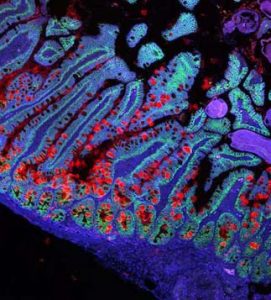Anxiety, Depression, and the Gut
When gut systems are compromised, the body’s happiness system is damaged, too.

Sherry Scheideman, Celiac, M.A., Registered Clinical Counsellor
- Celiac Counsellor’s Corner* is a place where Sherry Scheideman, M.A., Registered Clinical Counsellor, responds to your questions about the emotional and social issues that celiacs face. Diagnosed with celiac disease herself in 2001 in Victoria, BC, Sherry draws upon personal experiences and a Master’s Degree in Counseling to support you in transcending this ‘life transition’ and turning it into an opportunity to live your best life – ever.
If you have a comment or question for Sherry, click here.
Leave a comment for Sherry at the bottom of the page.
************
Simple, fixable physical problems in the gut can contribute to anxiety and depression. One reason is that a lot of our feel-good chemicals, such as hormones and neurotransmitters, are produced in the gut. When gut systems are compromised, the body’s happiness system is damaged, too.
Gut systems can get compromised by the hazards of normal living, such as food poisoning, traveller’s diarrhea, antibiotics, eating foods the body doesn’t like, stress, traumas, chronic unhealthy thinking patterns, and more. Even if we seem to recover from these things and forget about them, ongoing gut imbalance may eventually cause anxiety and depression.
The good news is that anxiety and depression can often be treated by going to a counsellor to de-stress and learn healthy thinking, and to a gut specialist to address the gut problem. In my experience, the best specialist for effective diagnosis and treatment of gut issues is a naturopath who specializes in the gut.
Following are some aspects of gut function that can get damaged, leading to problems throughout the system:

- Enzyme production. Enzymes are crucial for breaking down food.
- Gut motility. This is the movement of food through the gut. If it goes too fast or too slow, we have diarrhea or constipation.
- Gut bacteria. We need an enormous number of beneficial bacteria in the proper area of the gut. If we don’t have enough of the beneficial bacteria, or we have too many harmful bacteria, or the bacteria are living where they shouldn’t be, trouble results. For example, Small Intestine Bacterial Overgrowth (SIBO) can cause awful gas and bloating.
- Gut Lining: The gut is supposed to hold food inside itself while it breaks the food down into stuff the body can use. Only the properly broken-down stuff is supposed to be released into the body. When the gut is leaky (Leaky Gut), it allows chunks of un-broken-down food out into the body, causing inflammation and bloating.
- Absorption: We depend on the gut to break our food down into its usable bits that the body can absorb. If we aren’t producing the enzymes needed to break down food, or we don’t have the necessary bacteria living in our gut to break food down, or the bacteria are living in the wrong place and breaking the food down where it can’t be absorbed properly, or the system is pushing the food through too fast for absorption to happen, or absorption is prevented because the system is clogged up, we can eat a great diet but still be anxious and depressed because the body isn’t getting the nutrients it needs.
- Enteric Nervous System (ENS): Also called the “Second Brain”, this is the branch of our nervous system that takes care of digestion. It can be hurt by the stress of harmful thinking and emotional habits. For example, if your nervous system is stuck in fight-or-flight, the rest-and-digest part of your nervous system doesn’t get a chance to function properly.
 Trouble in any of these aspects of gut function can affect the gut’s production of feel-good chemicals, which can cause anxiety or depression.
Trouble in any of these aspects of gut function can affect the gut’s production of feel-good chemicals, which can cause anxiety or depression.
If you suffer from anxiety or depression, pay some attention to your digestion. If you notice constipation, diarrhea, food sensitivities, indigestion, heartburn, bloating, gas, anemia, or signs of inflammation such as brain fog, and so on, there may be something going on in your digestive system that is contributing to, or even causing, your anxiety or depression.
Go to a counsellor to work on your stressful thinking patterns and learn to relax in your body in the here-and-now. This will give your nervous system the support it needs to allow your gut to function. And, go to a naturopath who specializes in the gut. This will get your digestion back on track.
Anxiety, depression, and the gut are linked – it makes sense to heal them together.
Let’s do it!
Sherry
- Contact Sherry
- View previous Celiac Counsellor Corners enter ‘Sherry‘ into the search field at the top right of this page

“Life happens! Why not love it?”
“Being diagnosed with celiac disease and going gluten-free has challenged me to develop inner resources that I never knew I had, and I’m grateful for that. As a counsellor, I love to help other celiacs find their own gifts within the challenges of the disease, and to facilitate healing. Why not let your celiac disease motivate you to be your best self?”
- About Sherry Scheideman
- What happens in a session?
- Not in Victoria? No Problem. Sherry does Skype
- Be inspired – Sherry’s Blog
- Sherry Scheideman on Facebook
- Contact Sherry
-
- *Information and perspectives provided in Celiac Counsellor’s Corner are intended to provide general information, without independent verification on the part of The Celiac Scene for the accuracy of the information provided to it. The information is specifically not intended to be a substitute for medical diagnosis or treatment by your physician or other health care professional. You should always consult your own physician or other health care professionals about any medical questions, diagnosis, or treatment, especially before trying any diet. The Celiac Counsellor’s Corner does not accept any liability for any injury, loss or damage incurred by use of or reliance on any content contained herein.













